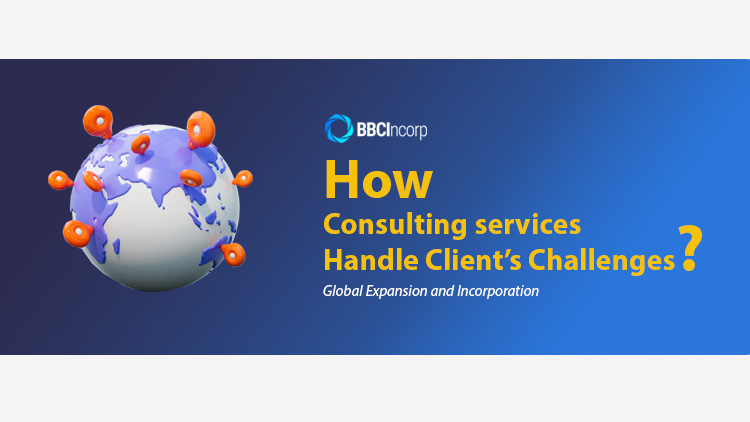
Since global expansion has been happening everywhere for such a long time, globalization’s effects can be barely noticeable. As the economic barriers between countries come down and international commerce increases, consulting firms become trusted advisors for clients expanding outside their borders.
However, professional consulting services struggle to adapt to a world where global expansion creates more problems that they need to tackle. Most consulting firms don’t have enough expertise or resources to support their clients with global expansion strategies or company incorporation.
1. Why has clients’ global expansion become a challenge?
White paper
Entity Formation On A New Horizon
Learn how professional services are exploring digital avenues for entity establishment.

As mentioned above, businesses have been expanding globally for a long time now. But with international trade estimated to quadruple by $68.5 trillion by 2050 (according to HSBC Commercial Bank), you may be taken aback by how large-scale and how fast the changes happen. Your clients’ global reach is increasing rapidly, and you may not be as ready for it as you think you are.
Your consulting job will need to go beyond well-established international territories like Canada, the EU, and China. Maybe you are a successful firm that has set up offices around the world and you are tempted to think that you are already big enough to handle these changes.
However, being global doesn’t mean that you are prepared to solve all the challenges of increasing globalization. Aside from compliance issues, there is also a lack of new talents. Consulting for clients who expand globally means that the professional service must study more about cultural, linguistic, religious, and regulatory minutes in the specific country.
Local resources and manpower are needed even more as a result, but the supply has not met the demand. In fact, Thomson Reuter’s Cost of Compliance Report in 2021 pointed out that only 31% of respondents expect growth in their compliance team, which is a 13% drop compared to 2018.
Another aspect that creates a headache for consulting services is the increased influence of automation and AI in all industries. Clients now expect more work to be done with less, as the power of automation has become common over the past decades. However, consulting firms are still slow to adopt automation.
Last but not least, we must talk about the elephant in the room: COVID-19. In the wake of the pandemic, compliance training has shifted to e-learning. According to Deloitte’s report in 2020, 62% of organizations are shifting to remote training rather than using the traditional blended learning (30%) and instruction-led (9%) methods. Consulting firms, not known for their adaptability, struggle with managing and training their growing remote workforces.
As globalization becomes a new norm, consulting firms have to deal with extensive compliance issues – both from the clients’ side and from internal as well. Discover more in our article Professional Consulting Services Struggle to Keep up with Risk & Compliance.
2. Consulting firms and the problems with entity incorporation
Company incorporation, or entity incorporation, is a challenging process for any expanding business. A company that opens its own foreign subsidiary has considerable control over how that subsidiary is managed. By assigning its own board of directors, the parent company can have an overview, “top-down” look of all the operations there and integrate its unique culture, values, and vision in the subsidiary.
However, that means there will be more challenges that consultation for these companies have to face as they need to take into account more local laws and specific regulations of the newly incorporated companies/subsidiaries. Here are some challenges that professional consulting services often meet regarding entity incorporation:
- Lack of knowledge for clients target countries
Business setup procedures are different in each country, consulting firms may have experience in big markets like the US, but for countries like Hong Kong, Singapore, Bahamas, Belize, or UAE, regulations, and standards are not as common. This complexity poses many challenges for consulting firms.
For example, in the EU (European Union), there are extensive regulations in place to ensure that products being sold take into consideration human and animal health, the environment, and consumer rights. Meanwhile, when starting a joint venture in China or Hong Kong, there is a requirement for a partnership between a foreign business owner and a Chinese citizen. On the other hand, the UAE market is split into different economic zones – Mainland, Free Zone, and Offshore, each is a jurisdiction with its own set of laws and rules for setting up a business.
Without the proper understanding of how each country has a different approach to company incorporation, it is easy to hit the pitfalls in compliance tasks.
- Traditional ways of entity formation
Most consulting firms provide clients with the old-fashioned way of business incorporation which heavily relies on back-and-forth emails and long follow-up phone calls. Obviously, it is a waste of time and facilitates an environment that is inevitable for errors to happen.
Alongside the lengthy application process, the amount of time and energy it takes to properly run a corporation while adhering to legal requirements is enormous. This rings especially true for globally expanding clients as consulting firms will need to advise them about many formalities and heavy regulations to maintain your corporation status.
For example, you need to help clients follow their bylaws, maintain a board of directors, organize annual meetings, keep track of minutes in those meetings, and file annual reports. Corporation types also have strict frameworks (for example, in the U.S., S-corps can only have up to 100 shareholders, who must all be American citizens; meanwhile, B-corps must score at least 80 on the public B Impact Assessment).
3. What can consulting firms do to overcome global expansion and incorporation problems?
Let’s take a look at several solutions based on new trends and innovations that can help the professional service industry keep up with clients’ rapid global expansion in this day and age.

- Automate entity formation with tools and portal
According to Deloitte, approximately 85% of surveyed organizations stated that there are benefits to be found when they shift to integrating and streamlining the use of technology for global compliance tasks.
Consulting firms will benefit from a GRC platform that can handle document automation, an online portal for company and incorporation management, e-billing, and e-signature. Firms can use software such as Fusion Framework or IBM OpenPage for compliance management, as well as keeping up with standards and regulations in different countries, improving visibility through predictive analytics, and raising company engagement using automation.
- Adopt technology solution
As mentioned in the first section, the Covid-19 pandemic has flipped business models upside down, prompting many industries, including professional consulting services, into adopting a digital model that enables remote work. According to Refinitiv’s Global Risk and Compliance Report in 2021, 43% of organizations surveyed would like to integrate automation under the pressure to increase revenue due to the virus’s spread.
Thankfully, by utilizing digital incorporation and compliance management, professional service firms can cut down on cost, time, and even errors, allowing for a seamless and smooth experience across the board. As of 2020, the large majority of the companies in the professional services industry worldwide had a high likelihood to adopt cloud computing within 2025. During a survey performed by the Statista Research Department, 88% of respondents stated their willingness to enable cloud technology for their consulting firms.
In an ever-changing landscape, the adoption of digital is inevitable. Yet, many consulting services are still lack of in-depth understanding of what and how to adopt digital solutions for better outcomes. Find out in detail via our article How Consulting Firms Implement Digital Incorporation Successfully.
- Outsource partners
Consulting firms are seeking help from outsourcing agents, or non-traditional corporate providers, for problem-solving. In a report on Technology Vision by Accenture, 90% of businesses utilize support from a third-party service provider to leverage digital technology and extensive expertise.
Engaging an outsourcing partner helps consulting services fulfill the gap of expertise and the lack of knowledge for clients’ targeted market. Most outsourcing providers have an in-depth understanding of global markets – from business registration procedures and requirements to regulatory standards. This helps consulting firms ensure compliance in all areas, cutting down on costs and workload.
4. Conclusion
Hopefully, through this framework, professional consulting services can develop a clear understanding of the challenges posed by clients’ global expansion. It is high time you formulated a coherent strategy for the future. After all, a good strategy is about knowing where you are and making the right choices about it.
Get in touch with our team via service@bbcincorp.com to learn more about our solutions for professional consulting services and find out how we can tailor our services to suit your current and future needs.
Disclaimer
While BBCIncorp strives to make the information on this website as timely and accurate as possible, the information itself is for reference purposes only. BBCIncorp would like to inform readers that we make no representation or warranty, express or implied. Feel free to contact BCCIncorp’s customer services for advice on specific cases.
Get helpful tips and info from our newsletter!
Stay in the know and be empowered with our strategic how-tos, resources, and guidelines.

